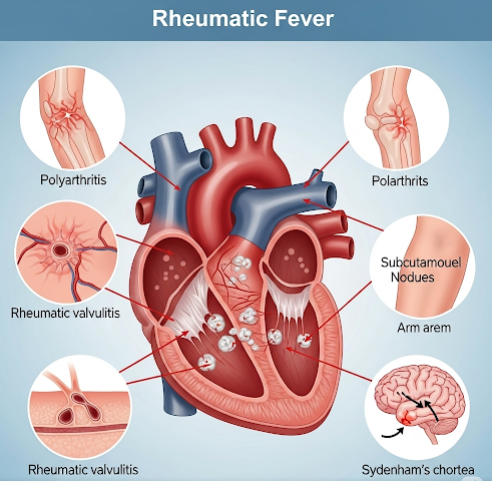Overview
Rheumatic fever is an inflammatory disease that can develop as a complication of untreated or poorly treated strep throat or scarlet fever, both caused by Group A Streptococcus bacteria. It primarily affects children and teenagers between 5 and 15 years old but can occur at any age. Rheumatic fever can cause permanent damage to the heart, joints, nervous system, and skin, making early diagnosis and treatment essential.
What is Rheumatic Fever?
Rheumatic fever is an abnormal immune response in which the body’s defense system mistakenly attacks its own tissues after a strep infection. The inflammation can affect the heart (leading to rheumatic heart disease), joints, skin, and brain. This condition is serious and can have long-term health consequences, particularly for heart health.
Symptoms
Symptoms of rheumatic fever usually appear 2–4 weeks after a strep throat or scarlet fever infection and may include
- Fever
- Painful, swollen joints (often moving from one joint to another)
- Red, hot skin over affected joints
- Small, painless bumps under the skin
- Rash with a pink, ring-shaped pattern (erythema marginatum)
- Fatigue and weakness
- Shortness of breath or chest pain (if the heart is affected)
- Jerky, uncontrollable body movements (Sydenham chorea)
- Nosebleeds in some cases
Causes
Rheumatic fever is caused by an abnormal immune reaction to Group A Streptococcus bacteria. When strep throat or scarlet fever is not treated adequately with antibiotics, the immune system may produce antibodies that mistakenly attack healthy tissues in the heart, joints, and nervous system.
Risk Factors
Factors that increase the risk of rheumatic fever include
- Recent untreated or inadequately treated strep throat or scarlet fever
- Age between 5 and 15 years
- Family history of rheumatic fever
- Living in overcrowded or unsanitary conditions
- Limited access to medical care or antibiotics
Complications
If untreated, rheumatic fever can lead to
- Rheumatic heart disease (permanent damage to heart valves)
- Heart failure due to valve damage
- Irregular heart rhythms (arrhythmias)
- Stroke from blood clots formed in damaged heart tissue
- Chronic joint inflammation
- Recurrent rheumatic fever episodes
Prevention
Prevention strategies include
- Prompt diagnosis and complete antibiotic treatment for strep throat or scarlet fever
- Practicing good hygiene to prevent the spread of strep bacteria
- Avoiding close contact with individuals who have untreated strep infections
- Secondary prevention with long-term antibiotics for people with a history of rheumatic fever to prevent recurrence
Treatment Options in Korea
South Korea provides high-quality diagnosis, treatment, and follow-up care for rheumatic fever with modern facilities and experienced specialists.
1. Antibiotic Therapy – Penicillin or other suitable antibiotics are prescribed to eliminate any remaining strep bacteria and prevent further immune attacks. Long-term preventive antibiotics may be needed to avoid recurrence.
2. Anti-inflammatory Medications – Aspirin, naproxen, or corticosteroids are used to reduce joint inflammation and fever.
3. Heart Care – If the heart is affected, patients receive monitoring and treatment from cardiologists specializing in rheumatic heart disease. Echocardiograms are used to assess valve damage.
4. Hospitalization for Severe Cases – In advanced cases with significant heart involvement, admission to a Korean cardiac center may be necessary for intensive monitoring and care.
5. Rehabilitation and Lifestyle Management – Korean rehabilitation specialists may recommend gradual return to activity, a heart-healthy diet, and follow-up visits for ongoing monitoring.
6. Leading Korean Medical Centers for Rheumatic Fever and Heart Complications
- Seoul National University Hospital – Department of Cardiology & Infectious Diseases
- Asan Medical Center – Heart Institute
- Samsung Medical Center – Pediatric Cardiology & Internal Medicine
- Severance Hospital – Cardiac Care Unit













